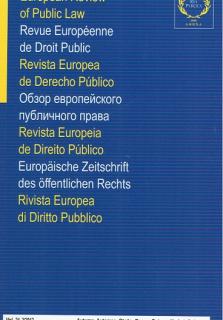
TRANSITIONAL JUSTICE AND DEMOCRACY TRANSITION:
LOOKING BACK AT THE PAST
FOR GAINING A BETTER PERSPECTIVE FOR THE FUTURE
ULRICH KARPEN
Prof. Dr., University of Hamburg
The paper is dealing with the issue of how a country can deal with the past and future after grave transitions in its social and constitutional conditions. It analyzes two different approaches: some countries and International bodies apply Criminal Justice, like in Germany the Nuremberg Trials of the Allied Powers to deal with criminal acts during World War II, Germany after the reunification of 1989, the Tribunal in Cambodia and the trials in the International Criminal Court in The Hague. Another approach is to apply "Constructive Justice", namely consolation, reconciliation, remorse, like the Truth and Reconciliation Commission in South Africa and similar institutions in Sierra Leone, Guatemala and Chile. Certainly these and other methods to cope with criminality in states in and after transition are guided by different notions of rule-of-law principles, which are presented finally.
L'article traite du problème de savoir comment un pays peut affronter le passé et l'avenir après de graves transitions dans ses conditions sociales et constitutionnelles. Il analyse deux approches différentes: Certains pays et organes internationaux appliquent la justice pénale: par exemple, en Allemagne les procès de Nuremberg par les puissances alliées pour faire face aux actes criminels pendant la Seconde Guerre Mondiale, l'Allemagne après la réunification de 1989, le Tribunal de Cambodge et les procès à la Cour pénale internationale de La Haye. Une autre approche est d'appliquer la "justice constructive", à savoir la consolation, la réconciliation et le remords: par exemple, la Commission de Vérité et de Réconciliation en Afrique du Sud et les institutions similaires en Sierra Leone, au Guatemala et au Chili. Certainement ces méthodes et d'autres pour contrer la criminalité aux Etats pendant et après la transition sont guidées par des notions différentes de principes de l'Etat de droit, qui sont présentées à la fin de l'article.





















